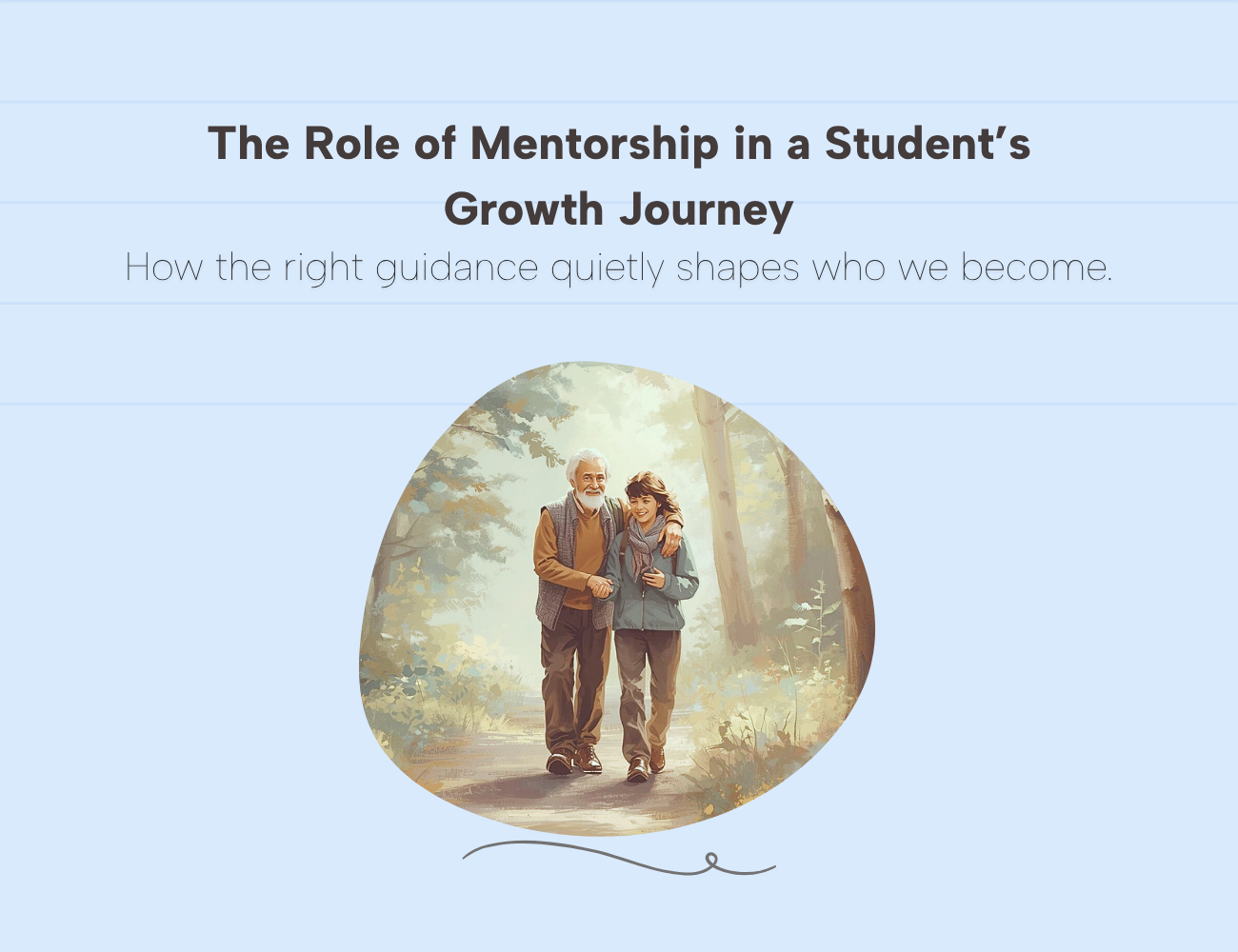How the right guidance quietly shapes who we become.
Growth Is Never a Solo Journey
Every student begins with the belief that they can manage everything alone. Apparently that confidence lasts until reality starts asking harder questions. At some point, talent plateaus, motivation dips, and direction becomes a little blurry. That is when guidance stops being optional and becomes necessary.
A mentor steps in without noise. Not to take control, not to overshadow, but to help a student see clearly again. Good mentorship is a sober presence. It gives structure when everything else feels scattered. It reminds the student that learning is not a race to the finish but a deliberate journey shaped by choices, habits, and reflections.
Nevermind the myth of “I can do it all myself.” Growth has always been a shared process. The right person beside you can change how far you go and how confidently you get there.
What Mentorship Really Means
Mentorship is often mistaken for extra coaching or someone handing out ready-made answers. In reality, it is something far more deliberate. A mentor becomes a steady presence who listens, observes, and guides without trying to duplicate their own path onto the student’s life.
A real mentor does not step in to impress. They step in to clarify. They help students think better, not think like them. They ask the right questions at the right time, the kind that make a student pause and reconsider their next step. Ditto for habits, mindset, and confidence.
Mentorship works because it is personal. It is built on trust, not pressure. On honest conversations, not filtered expectations. And on the quiet understanding that growth takes time, grit, and someone who genuinely cares about the journey.
Why Students Need Mentors Today
Students today live in a hyper-connected world, but not necessarily a guided one. Information comes from everywhere, yet clarity is rare. Expectations rise faster than understanding, and comparison has quietly become a daily habit. Apparently everyone is doing better, learning faster, achieving more. At least that’s what it looks like.
In this noise, a mentor becomes a sober anchor. Someone who helps students separate what actually matters from what only looks important. Someone who slows down the pace so the mind can breathe, reflect, and make deliberate choices.
The truth is, most students don’t struggle because they lack skill. They struggle because they lack direction. A mentor steps in at that exact point, offering perspective, structure, and the kind of steady reassurance that keeps a student from drifting.
Nevermind the chaos outside. With the right guide, students learn to focus, grow, and move with purpose rather than pressure.
The Emotional Anchor – Confidence, Stability, and Solace
Behind almost every confident student is someone who offered calm when things felt uncertain. A mentor becomes that quiet anchor. They don’t falsify hope, they don’t exaggerate praise, and they don’t panic when the student does. Their presence alone brings a kind of steadying effect that textbooks can’t duplicate.
Students often look for quick fixes. However, real growth needs emotional stability, not shortcuts. A mentor provides exactly that. They become the person who says, “It’s alright, try again,” in a tone that feels sincere, not scripted. They offer solace without making the journey comfortable to the point of stagnation.
This emotional support matters more than most people realise. When a student feels understood, their willingness to try increases. When they feel safe to fail, their ability to grow deepens. Confidence is not built through achievements. It is built through the presence of someone who stands by you while you build yourself.
The Skill Builder – Habits, Thinking, and Real Learning
A mentor strengthens the skills that rarely appear in any syllabus. They help students build gritty consistency, deliberate practice routines, and the discipline to stay focused even when the excitement fades. Good mentors teach students how to think, not what to think.
They encourage simple habits that create long-term change. Breaking big tasks into manageable parts. Showing up on days when motivation refuses to cooperate. Understanding concepts instead of memorising them. These are the small, steady skills that separate lasting growth from temporary progress.
Apparently, talent can take a student only so far. Strong habits take them the rest of the way. And mentors have a way of spotting gaps early, long before those gaps turn into bigger obstacles.
Real learning happens when someone nudges you at the right time, corrects you without crushing you, and holds you accountable without making you dependent.
The Perspective Shift – Seeing Possibilities, Not Limits
A mentor often becomes the first person to show a student what they could be, not just what they currently are. This shift is subtle but powerful. Where a student sees limits, a mentor highlights possibilities. Where the student hesitates, the mentor offers a well timed question that changes how the situation looks.
Perspective is everything. Apparently, many students operate with a narrow view shaped by pressure, routine, or lack of exposure. A mentor widens this view. They introduce new fields, new ideas, new standards of thinking. They help students realise that ambition is not arrogance and curiosity is not distraction.
Sometimes, a single conversation can alter a student’s direction more than an entire year of studying. Not because the mentor gave answers, but because they asked the kind of sober, grounding questions that disrupt old assumptions.
This is the quiet influence of mentorship. It opens doors students didn’t know existed, and it encourages them to walk confidently through those doors when the time comes.
Also related: Learn How To Study Daily Without Relying on Motivation
Mentorship in the Indian Context
In India, students often grow up surrounded by advice but deprived of real guidance. Everyone has something to say, but very few take the time to understand. The result is a noisy environment where expectations are high, pressure is constant, and clarity is scarce.
Apparently, many students don’t struggle because they lack ability. They struggle because no one ever helped them make sense of what they were capable of. This is where mentorship fits exactly right. It replaces confusion with direction, and judgment with perspective.
A mentor offers something our systems often miss. Space. Space to think. Space to question. Space to try again without fear of being compared or dismissed. In a culture that values results, a mentor reminds the student that the process is equally important, and often more revealing.
Nevermind the chaos around them. A grounded mentor can help an student build confidence, develop identity, and move towards a future that feels chosen rather than imposed.
How Students Can Make the Most of a Mentor
Mentorship only works when the student shows up with intention. A mentor can guide, but they cannot grow on your behalf. The student has to participate, reflect, and respond. That is where the real change begins.
- Ask honest questions, even the ones that feel basic. Apparently those are the ones that open the deepest conversations.
- Reflect on feedback instead of reacting to it.
- Stay consistent with the small habits your mentor recommends. Grit builds quietly.
- Share doubts without filtering them. A mentor can only help with what they know.
- Observe how your mentor thinks. Not to duplicate them, but to understand the deliberate patterns behind their decisions.
Growth is not a dramatic moment. It is a steady line of choices. The more a student engages, the more the mentorship becomes meaningful.
Closing Thought – The Person Who Stands Beside You
A mentor is not there to lead from the front or push from behind. They walk beside you. Quietly. Consistently. Without trying to rewrite your life into a duplicate of theirs. Their role is simple but profound: to help you think with clarity, grow with confidence, and choose your path with intention.
Apparently, the real impact of mentorship becomes visible only later. In the way you speak. In the way you handle setbacks. In the way you carry yourself during difficult moments. These are the subtle traces of someone who believed in your growth long before you fully believed in it yourself.
Nevermind the noise outside. With the right person beside you, the learning journey becomes less confusing, more deliberate, and far more meaningful. Mentorship is not about giving answers. It is about shaping a mind that can stand steady, question bravely, and keep growing long after the mentor steps back.

